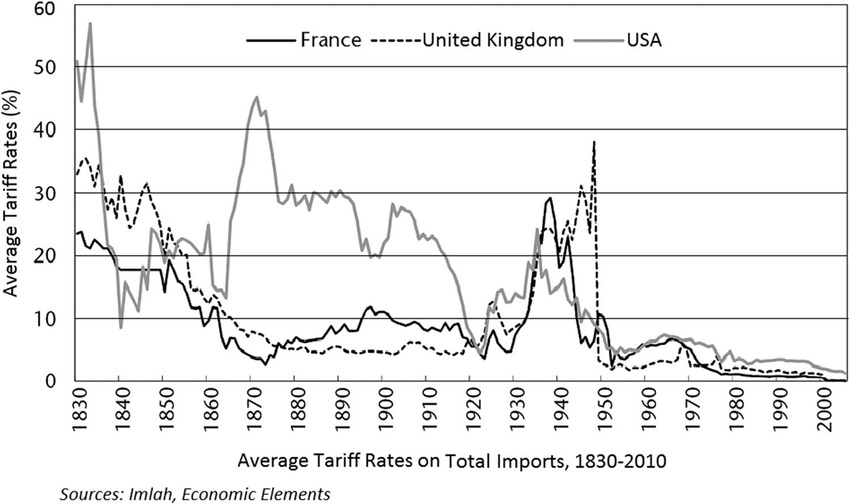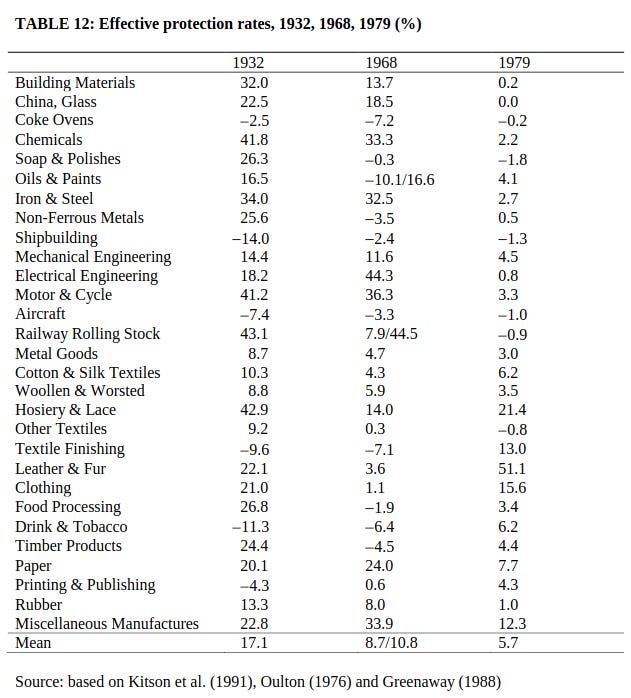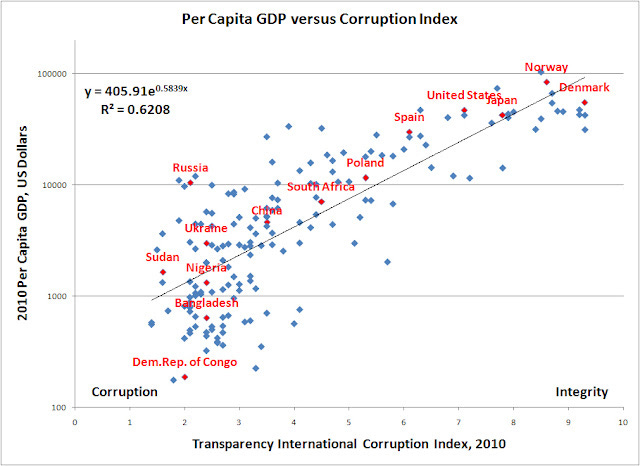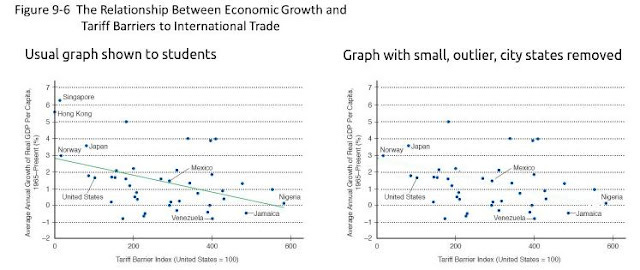The Free Trade Mantra is that goods and services should be produced where they are cheapest. This will control prices and optimise production. There are several problems with this mantra.
There is a major problem with the Free Trade Mantra. A country may not have the resources to compete with resource and labour rich places like Russia, China, India and the USA. Free Trade favours big countries and a few entrepots. This is why it was favoured by the UK when it had an Empire and access to unlimited resources. Countries that cannot compete openly can still have vibrant local economies if they erect tariff barriers.
Another problem with the Free Trade Mantra is that different levels of taxation, employment legislation and wildly different levels of social and health provision affect the cost of production. Producers will operate from countries with the least social, environmental and health costs to keep their prices down.
Free trade is about the consumer, the objective is that the consumer is offered cheaper goods. However, the consumer is also a worker and a citizen. If they are in low paid employment or out of work because of free trade they will not be able to enjoy the cheaper goods. If they are denied social, environmental and health provision, like Uighur slave labourers in China, they will not be able to enjoy anything. It is always a well heeled politician who makes the ‘cheaper goods’ defence of free trade.
Free trade is not responsible for enhanced global prosperity. This has resulted from individual countries tackling corruption, educating the people and introducing the rule of law for business activities. Multinationals always make the false claim that they are responsible for the rise in international living standards. It is the adoption of the Western approach to commerce that has led to increased global prosperity, not openness to multinational corporations.
The USA favoured Free Trade and actually enforced this wherever it could when US multinationals were thriving. (See Trump Mad or a Cure for Madness?). The rise of powerful multinationals in other countries has changed the US viewpoint and policy.
The most serious downside to Free Trade is that it shifts economic and hence political power to unaccountable multinational corporations. It is multinational corporations that reap the greatest benefit from Free Trade. These are becoming organised and represent a serious challenge to Nation States (See The World Economic Forum ).
In ‘Tariffs are Necessary: Part 1’ it was shown how the introduction of tariffs was correlated with the Great Depression of the 1930s but did not cause it. In this Part 2 the effect of the removal of tariffs on British industry in 1973 will be considered. (See ‘The Details’ at the end for sources etc).
The entry of the UK into the EEC in 1973 was a disaster for British manufacturing. UK manufacturing declined by about 15% between 1973 and 1983. The decline in car manufacturing was especially severe. UK car production halved. The reasons for this were the sudden lifting of tariffs, the changes in purchase tax and the backfiring of the measures taken to avoid tariffs.
In the 1960s the UK had a 25% tariff on foreign cars whilst the EEC imposed a 17.5% tariff on car imports. The effective UK tariff on foreign car imports, including protective measures was 36%. The purchase tax on cars was extreme, in 1971 it was 33.5% . Entry into the EEC removed the tariffs and replaced purchase tax with VAT at 10%. Foreign cars became 48% cheaper overnight.
Car manufacturers had set up factories in the EEC to avoid tariffs. This backfired on the UK when tariffs were lifted in 1973. The factories started to export ‘British’ cars from the EEC to the UK.
“The situation for Ford of Great Britain and Vauxhall was … dire. Many EFTA countries had joined the EEC at the same time as Britain and were soon supplied with new cars from Ford and General Motors’ European plants instead of their British factories. Ford and General Motors in Britain went from being exporters to importers as a way of exploiting growth in the UK market and circumventing industrial action in their British factories.
Their UK plants became superfluous and marginalized. By 1983 half of all ‘British’ Fords sold in Britain were continental imports. The situation was even worse with General Motors. Two thirds of all Vauxhalls sold in Britain were imports.” (ARONLINE).
Within 7 years of joining the EEC the production of cars in the UK fell by a half.
The UK became the ‘sick man of Europe’ and vast areas of the Midlands and North became wastelands of derelict factories. The loss of protection for internal markets caused the 1976 IMF Crisis.
The UK car industry never recovered, The sales figures for cars made in Britain were 779,584 in 2024 compared with 2,250,000 in 1971. Worse still, many of the ‘British’ cars made in Britain are mainly composed of EEC/EU parts. The EEC/EU imposes a minimum of local parts to be used by foreign owned car makers: in the case of Korea this percentage was 55% local parts, for Japan it was 80% local parts. Hondas made in Britain were mostly British. However, after 1973 French, German and other EU companies operating in Britain could use any amount of French or German parts and no local parts at all. Nowadays the EU factories exist in the UK as a backstop against the future imposition of tariffs. Despite Brexit ‘British’ car sales are actually still largely EU car sales from British assembly plants because of the Free Trade Agreement between the EU and UK which has no tariffs or quotas.
It is clear from this that tariffs protected the UK car industry until the late 1960s. The sale of Vauxhall and Rootes to multinational corporations and the ownership of Ford by a multinational meant that the UK was wide open to foreign production when tariffs were lifted because they had begun producing British designed and engineered cars in the EEC. They could easily replace UK production with production from foreign plants when the barriers were lifted in 1973.
The Free Traders will point to industrial unrest in the UK as the cause of the collapse of UK manufacturing. There were industrial relations problems in the British car industry, especially in Austin, Rover and Morris (which became BMC then Leyland). There were also problems with under investment across the industry. Despite this car sales were high. However, the lifting of tariffs in 1973 had a cataclysmic effect, halving production in 7 years.
Brexit has had little or no effect on the trading relationship between the UK and EU because there is a Free Trade Agreement between the two countries. There are still no tariffs or quotas. ( See UK-EU Trade: Links to key data ).
The UK can only be prosperous if it has a vigorous manufacturing industry and creates high productivity jobs. It will be poor if it descends to the lowest common denominator in wages as a result of free trade and uses migration to compete for low wage production.
Free Traders are a mixture of Imperialists and New Racists . They might talk about inflationary results of tariffs but there is little evidence for this. They might talk about ‘economic efficiency’ but the need to maintain a national democracy and culture is more important than this. The real desire of Free Traders is Internationalism. (See The Internationalist Adversaries).
The Detail
Manufacturing output in the UK fell dramatically after entry into the EEC:
Source BBC
Openly declared tariff rates have been low since the World Order was instituted by the Western Allies (especially the USA):
(Source: Researchgate)
UK vehicle production halved in 7 years after EEC membership in 1973. Modern UK car production is dominated by plants that assemble cars from EU made parts.
Source Commons Library
The open tariffs on foreign manufactures were different from the overall protection rates. As an example the declared tariff on cars was around 25% in the 1960s but the overall protection rate was 36% in 1968:
Source: OPENNESS, PROTECTIONISM AND BRITAIN’S PRODUCTIVITY PERFORMANCE OVER THE LONG-RUN
Global living standards have increased because of decreased corruption:
And increased education:
(UK gets poor value for education)
And the rule of law. It is the adoption of the Western approach to commerce that has led to increased global prosperity, not openness to multinational corporations.
Tariffs have little effect on economic growth:
Trump tariffs may not be so bad for UK. The UK has a surplus on service sales to the US and these currently have no tariffs.
Source Capital Economics
However, the multinationals are squealing like stuck pigs. The BBC is their mouthpiece and it has had nothing positive to say about tariffs. People in the UK are being told that the end of the world is nigh today (April 7th) despite the Dow and FTSE only falling to the levels that they had at this time last year.
Postscript: By 30 May 2025 Trump tariffs had had little effect, the Dow, FTSE etc had recovered much of their brief fall of April, US Treasuries showed little change from 2024. It is too early to know the long term effect on US GDP.
Tariffs are Necessary. Part 1.
Tariffs are good for nation states. We will take a look at the raising of tariffs after the Great Depression began and the removal of tariffs when the UK joined the EEC in 1973 to see how tariffs affect the economy.











